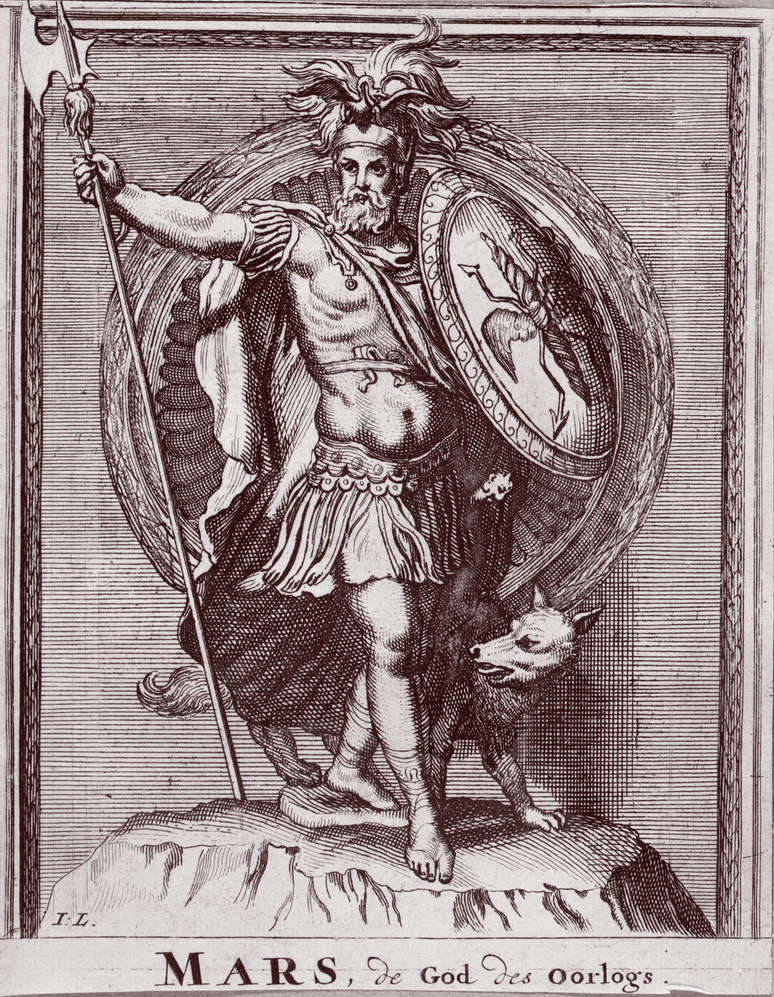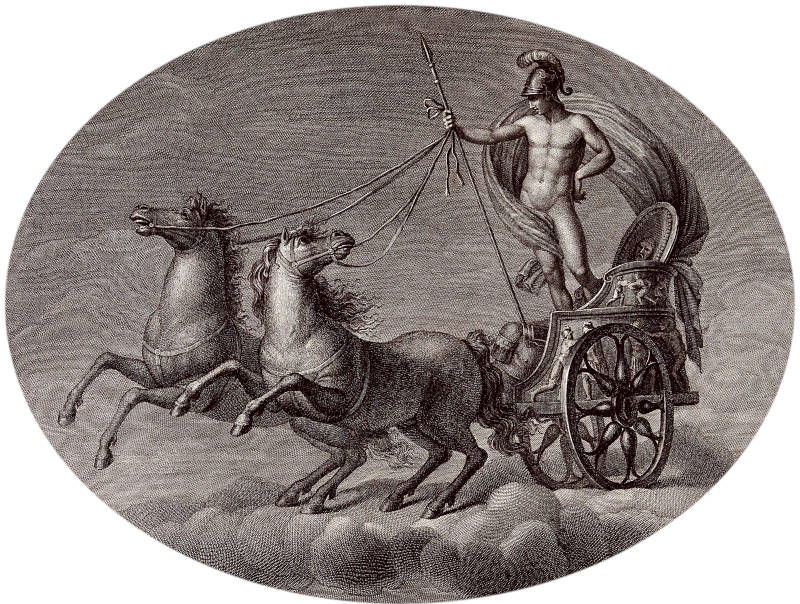Planet Summary
- Temperament: Hot, Dry – Choleric
- Color: Red
- Quality: Nocturnal Malefic
- Names: Mars, Nergal, Anhur, Ares
- Rulership: Aries, Scorpio
- Metal: Iron
- Keywords: War, fire, disease, struggle, courage, drive
God of War
Nergal, Anhur, Ares, Mars. According to David McCann, these were some of the gods that were associated with this shiny, fiery, red, and sparkling planet. The first one, Nergal, was the original ruler of this planet in Babylon, the birthplace of astrology. Nergal was responsible for themes that illustrate what Mars would come to signify through the next millennia: he was the god of the underworld, bringer of diseases, fire, and death. Nergal was feared by the Babylonians.
In the same manner, Ares was not a god particularly cherished by the ancient Greeks. As the god of war, he came to be associated with the planet Mars once ancient Greek astrologers made a connection between their gods and the Babylonian gods. Even though the Greeks are known as historically militaristic people, they knew the risks of war. Since Ares represented the horrors of warfare, blood lust, and the violence and cruelty that accompanied it, the Greeks did not appreciate this god – they feared him.
These two gods, Nergal and Ares, represent the main quality of Mars at the beginning of the astrological tradition: it is a star with ominous significations. It was considered the lesser malefic, but being the lesser does not mean that its maleficence was diminished. Mars is the planet that rules violence, war, mugging, quarrels, accidents, and pain.
Another aspect connected to the qualities assigned to this planet is its celestial appearance. It has a red color, which probably brought about the association between the star and blood. Evoking the color of blood is not a positive omen, since we do not want to see blood in our lives – its appearance points to accidents, violence, disease, and war.
Mars’ rulership of iron is also directly related to the planet’s red color. After all, when iron rusts, its color changes to red. Curiously, iron is what covers part of the surface of Mars and is responsible for its red color. Of course, the ancients did not know that, but it is impressive how some recent astronomical discoveries about the planets match their ancient symbolism.
In the ancient world, iron was associated with weapons, a metal used for cutting and attacking others. In this sense, Mars was related not only to bloodshed but to weapons used to commit acts of violence, reinforcing the planet’s rulership of warfare. However, we do know that iron was also used for the making of tools that could be used for more peaceful purposes.

When we search for Mars’ more beneficial qualities, we find that, in fact, cutting, burning, and fighting can have positive effects. Consider, for example, how a doctor uses a scalpel to heal others, or how the cook slices ingredients and combines them with fire to nourish others – connecting the realm of Mars to that of the Moon, which is responsible for nourishment. The beneficial burning quality can be associated also with garlic, a martial vegetable, since its strong and heating scent is directly responsible for its antibacterial and antiviral qualities, cleansing our lungs with its strong smell.
Maybe it is for these benefic qualities related to the use of tools, cutting, and heating that the Roman god Mars was not as feared as the Greek Ares. Mars was a god dear to farmers since he could protect crops and cattle. The association could also be related to the iron tools and plows that farmers used. This association between iron and farming, however, is not present in the origins of astrology. Mars was not initially a planet related to agriculture, a theme ruled by Saturn instead.
Protecting crops and cattle also suggests the warrior-like characteristics of the Roman god Mars. The beneficial qualities of this planet are always related to the advantageous direction of energy, fighting for a good cause, or conquering enemies that oppose you. That is to say that, even if Mars is primarily connected with negative themes and circumstances, something good can come of these through the energetic use of action and the cutting out of what is not good or useful.
The astrologer Deborah Houlding calls this characteristic the “solar-hero principle”. This association comes from the idea that a hero is one who fights in the name of justice and defies evil. We can find this kind of association in modern superheroes, who are, in some sense, martial: they fight against villains, using violence to defeat them. However, they channel some key solar principles: they fight for justice, not for blood lust. They are warriors that conquer their enemies for the greater good.
In terms of mythological connections, McCann alludes to the Egyptian god Anhur, considered by the Greeks to be equivalent to Nergal and Ares. He was a god of war, but like the Roman Mars, he was popular among the common people because he was thought to protect them against danger. The positive manifestation of Mars is based on the idea that a warrior is not such a bad thing when they fight for one’s protection and benefit.
It is important to highlight that, while being a warrior is martial, their beneficial qualities may not be primarily martial. When we analyze a natal chart, transforming the malefic Mars into a planet capable of good results depends on various mitigating factors. Even with various mitigating factors present, Houlding explains that Mars is never an easy planet, its benefits emerging only through challenge and difficulty.
Mars in Signs
The fearsome Mars finds the best place for its manifestation when in the sign of Aries and Scorpio, its domiciles, and in the sign of Capricorn, its exaltation. It suffers in its exiles, Libra and Taurus, and in its fall, Cancer.
Aries is a diurnal fire sign. In the northern hemisphere, the Sun enters Aries on the spring equinox, the moment of the year when the day becomes longer than the night. The Sun exalts in this sign for this reason, but these conditions also favor Mars, a hot, fiery planet that thrives when the forces of the day are blossoming. In this sign, the qualities of Mars are exalted: it is like a warrior on a battlefield, capable of defeating its enemies.
Scorpio, on the other hand, is a nocturnal water sign. For this reason, it balances the hot and warm qualities of Mars, alleviating its impulsiveness and bringing a more sober and occult expression of the planet’s martial qualities. Here, Mars is an assassin in the shadows, lurking in the night, capable of inflicting direct damage without being seen. Like the sting of the Scorpion, its poison is lethal and administered with surgical precision.
Capricorn, a Saturn-ruled sign, is a territory of excessive discipline and order. The scarcity of resources, typical of winter, a Saturnian season, indicates the necessity of an extra dose of martial control. That is why Mars feels very good in this sign, as it can direct its energy with maximum efficiency since life is at stake.
On the other hand, the signs opposite each of these are where Mars finds difficult expression. Libra and Taurus, the two Venus-ruled signs, are places of pleasure and appreciation, not of fighting for life. Mars is too suited to the battlefield to have the capacity to relax. Cancer, ruled by the Moon, is the fall of Mars. Cancer territory is a place of nourishment, not of fighting; Mars in Cancer is like a warrior in a maternity ward.
Mars in a natal chart
According to ancient astrologers, Mars is not always a planet that represents our personalities. But in some cases, such as when it is in the sign of the Ascendant is or if it is the ruler of the Ascendant, it can be important in the delineation of the mind and behavior of a person.
When this is the case, Mars can point to different possibilities depending on whether it is well dignified or not. When Mars is in a good position in a chart, it will represent a person with drive and energy, capable of accomplishing much, courageous, fearless, able to defend the weak and ascend socially through their powerful will. Energetic action that can make a difference in the world comes from a martial drive; however, since Mars is always connected with that that is hard and abrupt (in the words of the 2nd-century astrologer Vettius Valens), the life of a person with a powerful Mars will be filled with challenges and trials. Victory will only come through struggle.

An ill dignified Mars points to a different personality. The ancient astrologers would say that it makes the person violent since the Mars warrior quality would be misdirected. If a good analysis of a chart indicates the predominance of an ill Mars in the behavior of a person, we see the type of people who seek dominance by all means, not hesitant to harm others.
Besides influencing the native’s personality, a good positioned Mars could indicate the circumstances in which someone is benefited by difficult times; in other words, struggle and strife that bring about good results. On the other hand, a badly positioned Mars is an ominous sign, a bringer of violence and accidents, a bad sign in general. Of course, it is not black and white – there are other considerations in a chart that can make a bad Mars not so bad in its results, as a good Mars might not be so beneficial depending on other factors.
The lesser malefic is certainly a planet with a strong impact on our lives. A clear understanding of it can bring knowledge of the difficulties we face in life and, in some cases, reveal our strengths to weather bad situations. Accepting the challenges that we have to deal with throughout life is an important way to achieve peace with one’s path, doing one’s best to change what can be changed, and accepting what is beyond one’s control.
References
- ABU MA’SHAR. Great Introduction
- HOULDING, Deborah. Mars: solar hero or deadly villain?
- KOLLERSTROM, Nick. Planets & Metals: The Traditional Association of Mars & Iron
- LILLY, William. Christian Astrology
- MCCANN, David. Mars in Myth & Occult Philosophy
- VALENS, Vettius. Anthologies
- WARREN-DAVIS, Dylan. Garlic: the embodiment of a martial herb
- WATTERS, Joanna. Introducing Mars
Images on this page
- mars-god-of-war: J. Lamsvelt, 1686 | public domain
- mars-chariot-raphael: Engraving by C. Lasinio after Raphael, 1516. | Public Domain Mark 1.0
- mars-chariot-maarten-de-vos: Vos, Maarten de, 1532-1603 | Public Domain Mark 1.0
